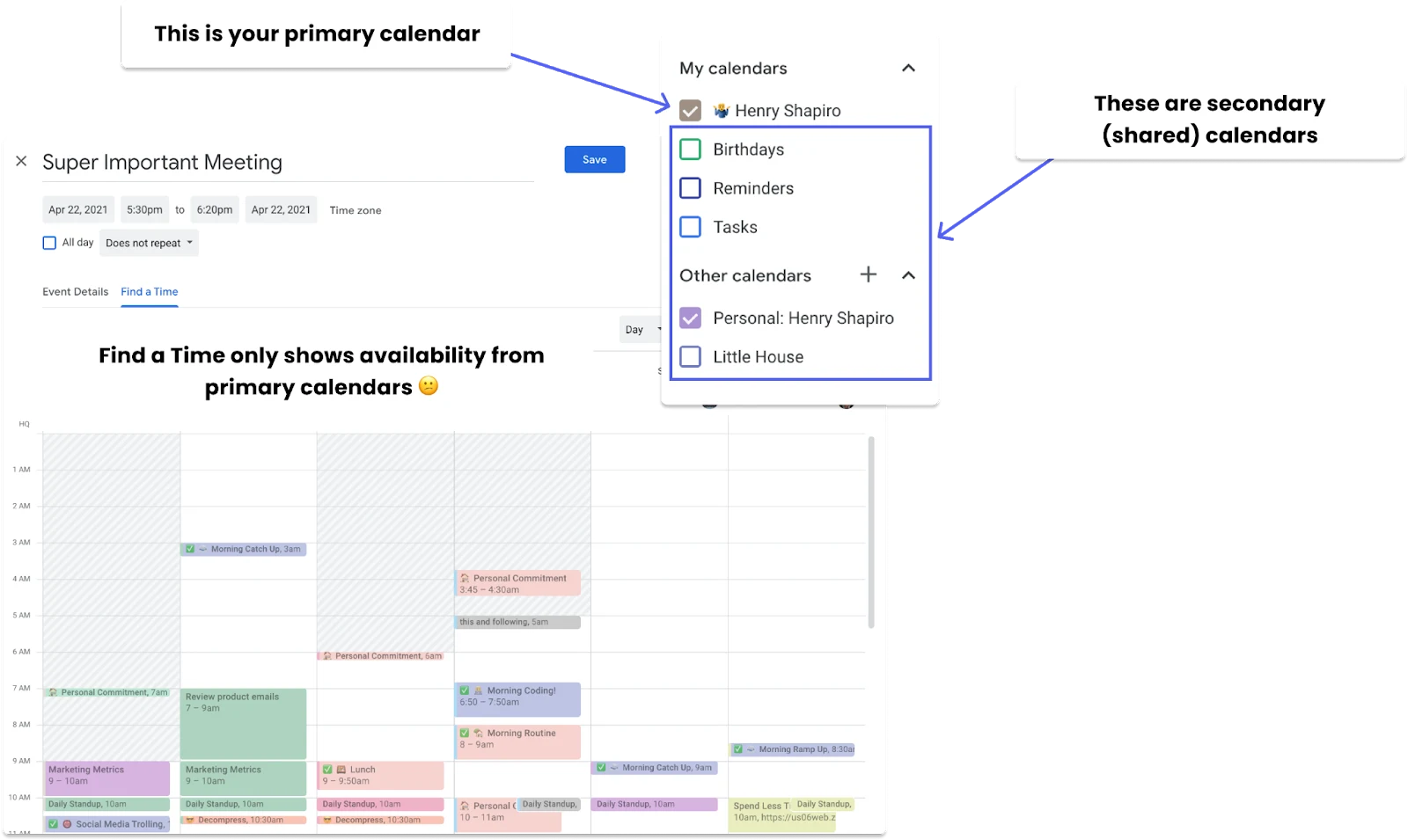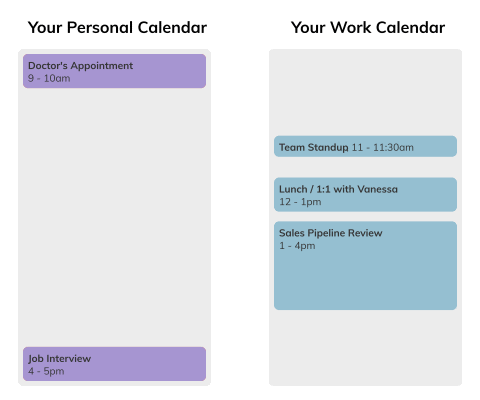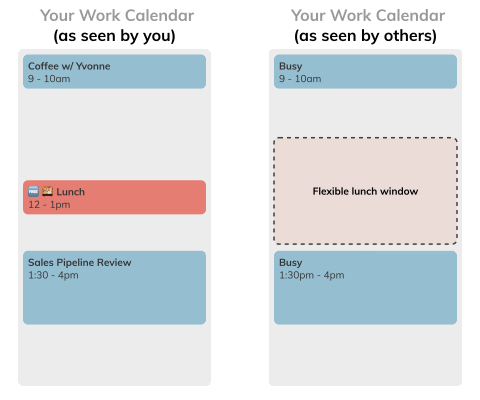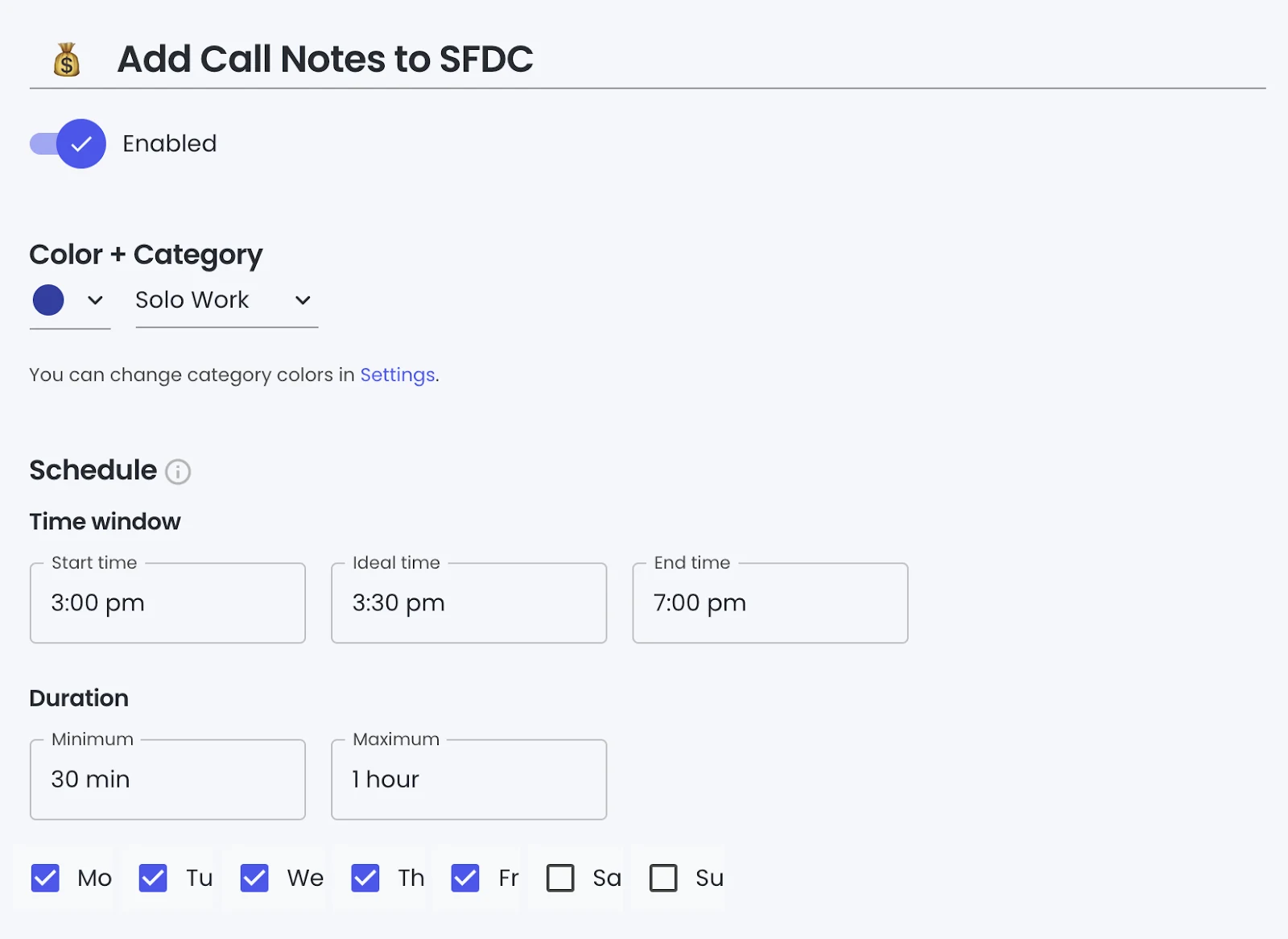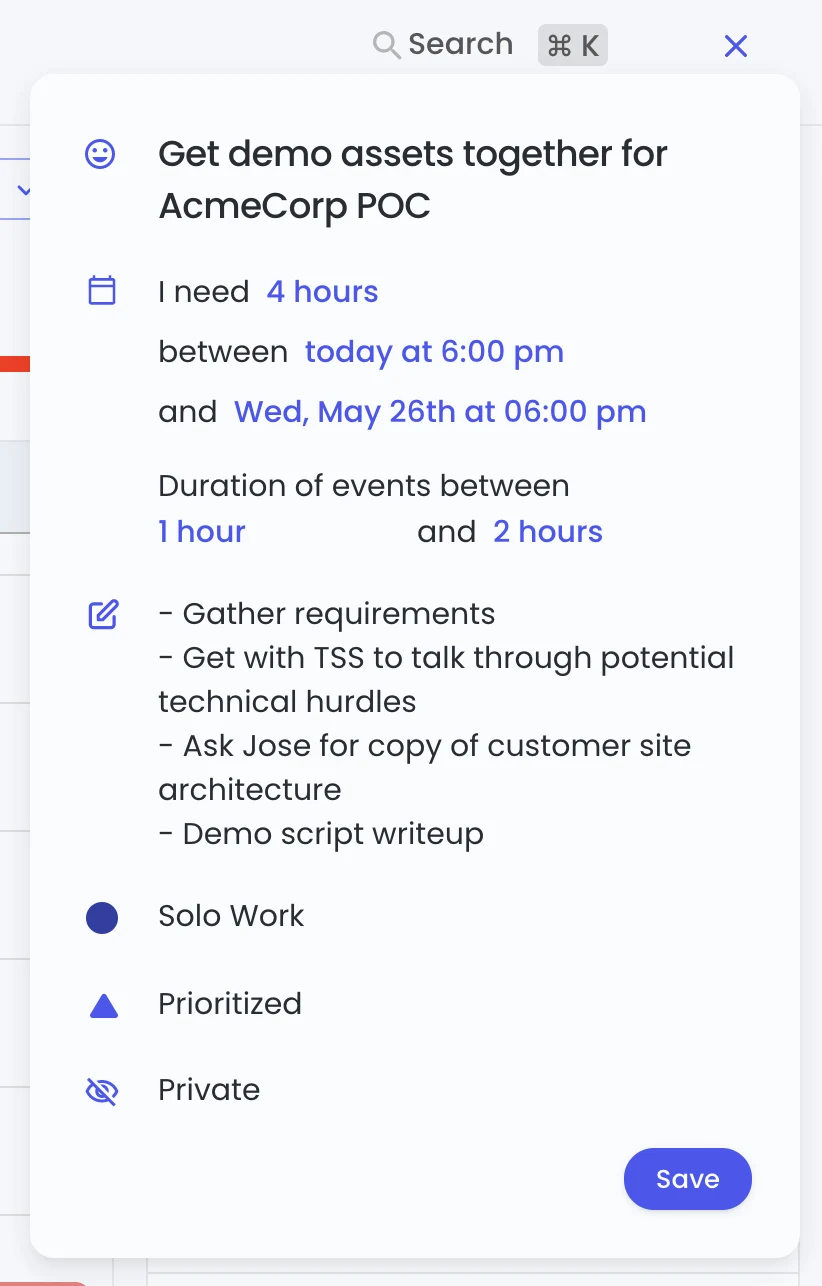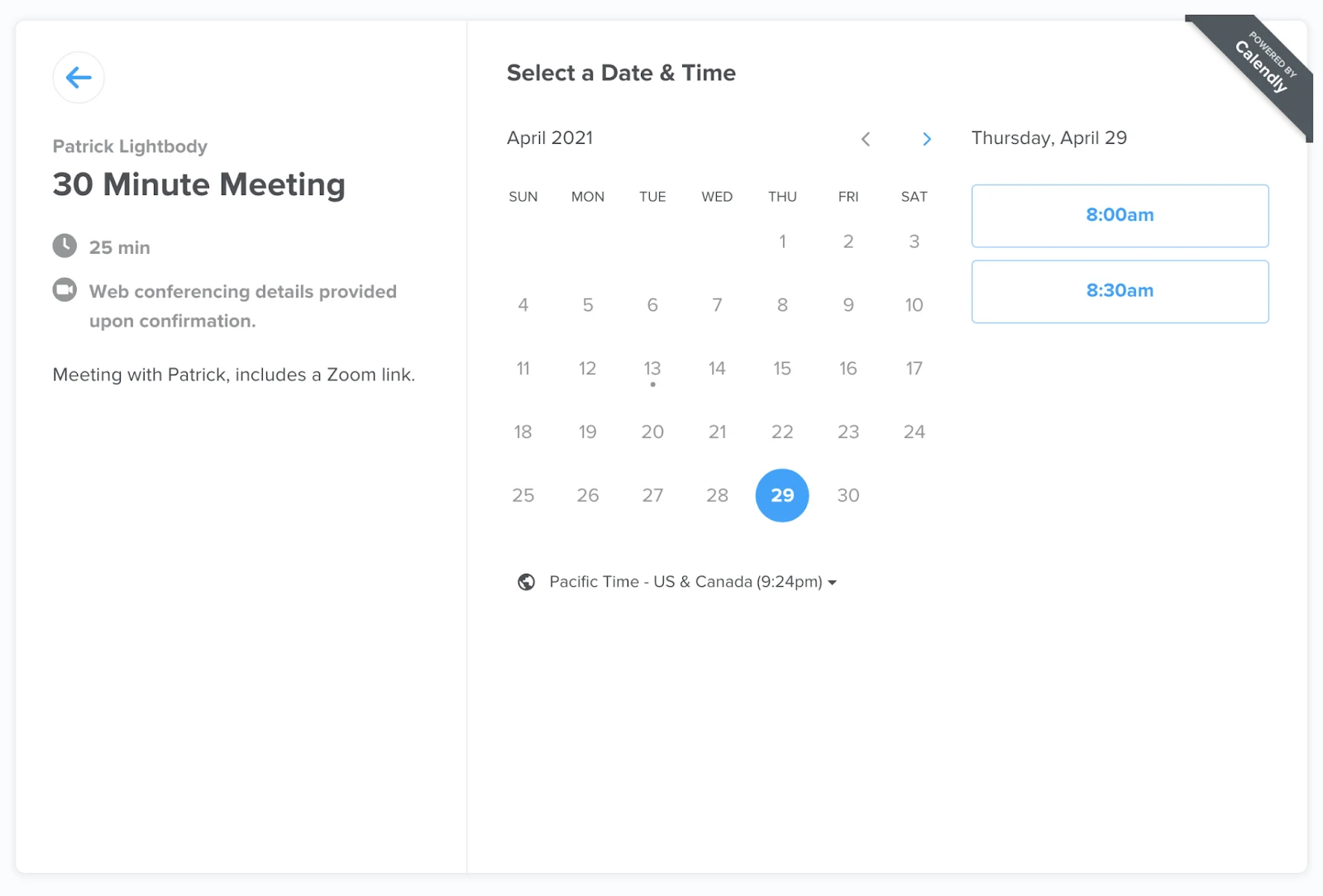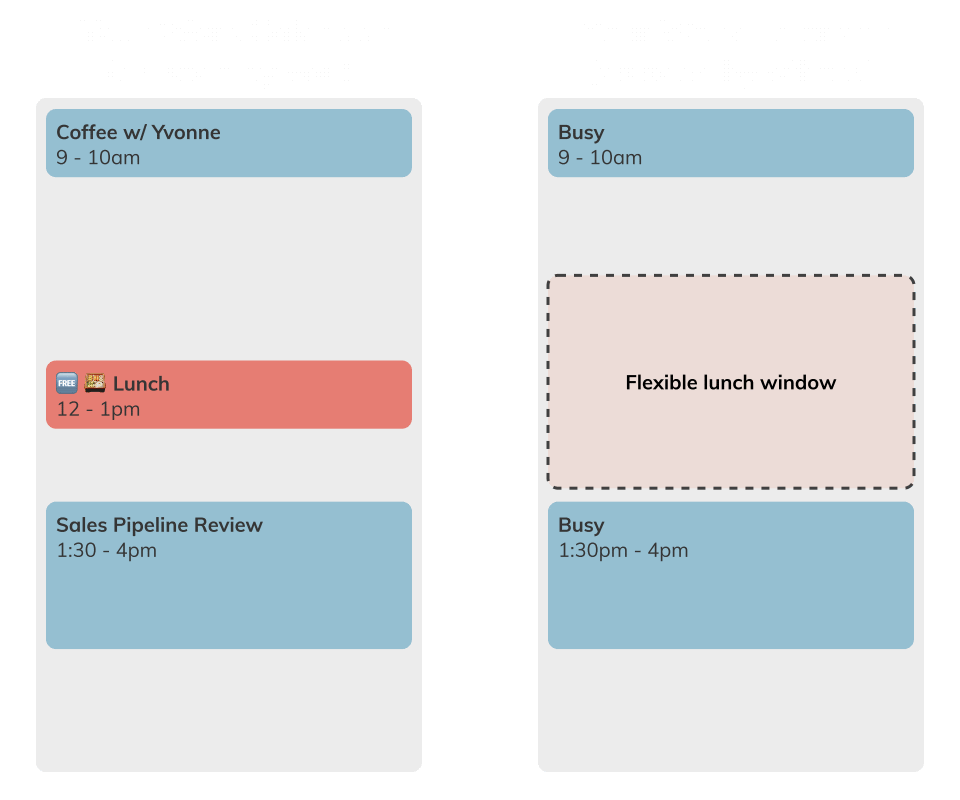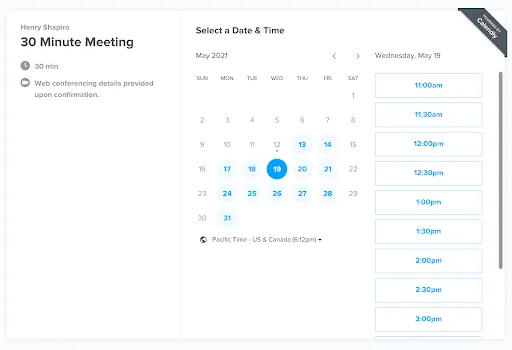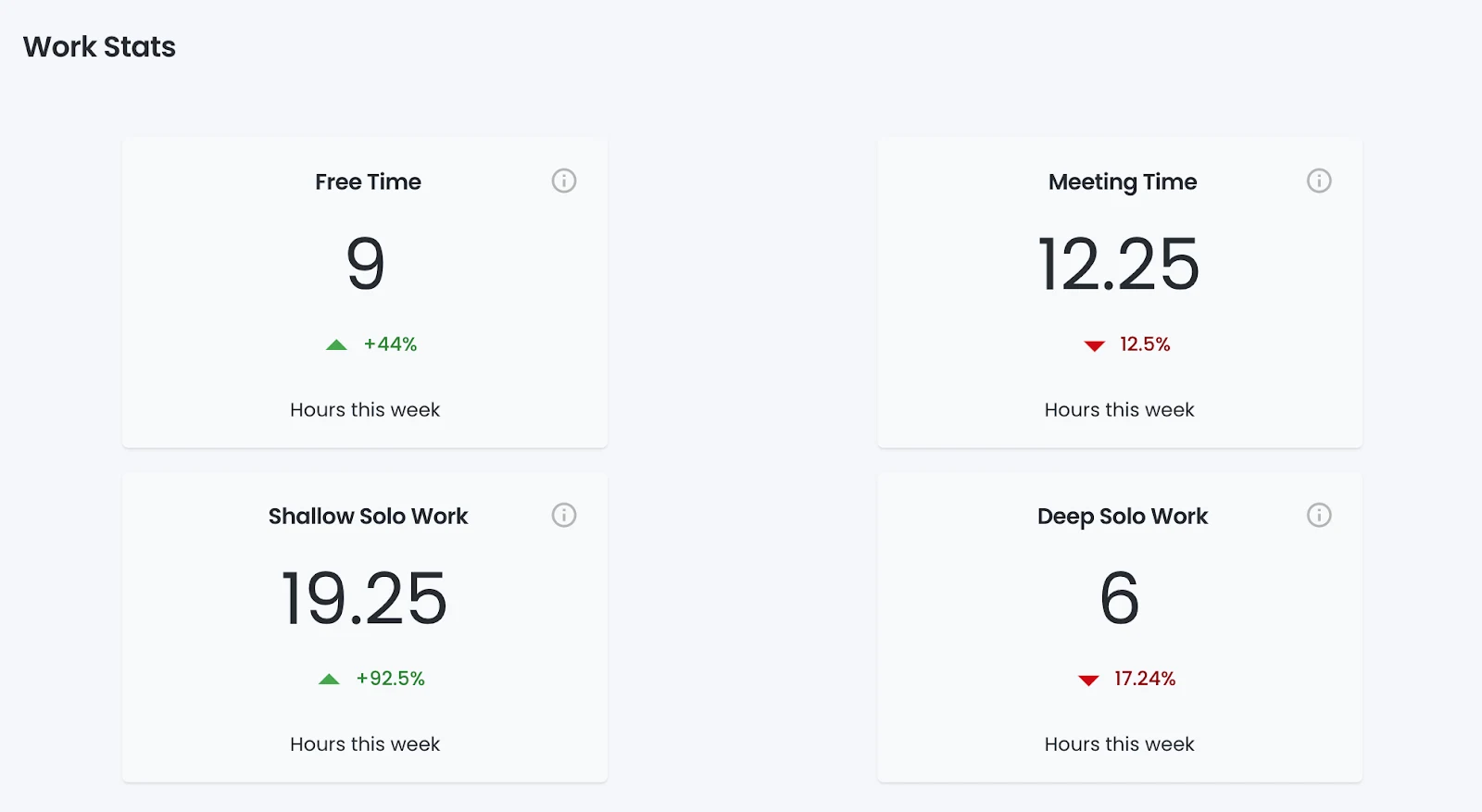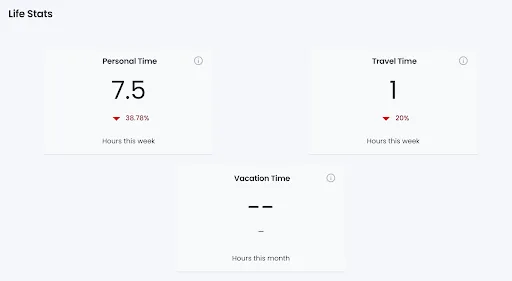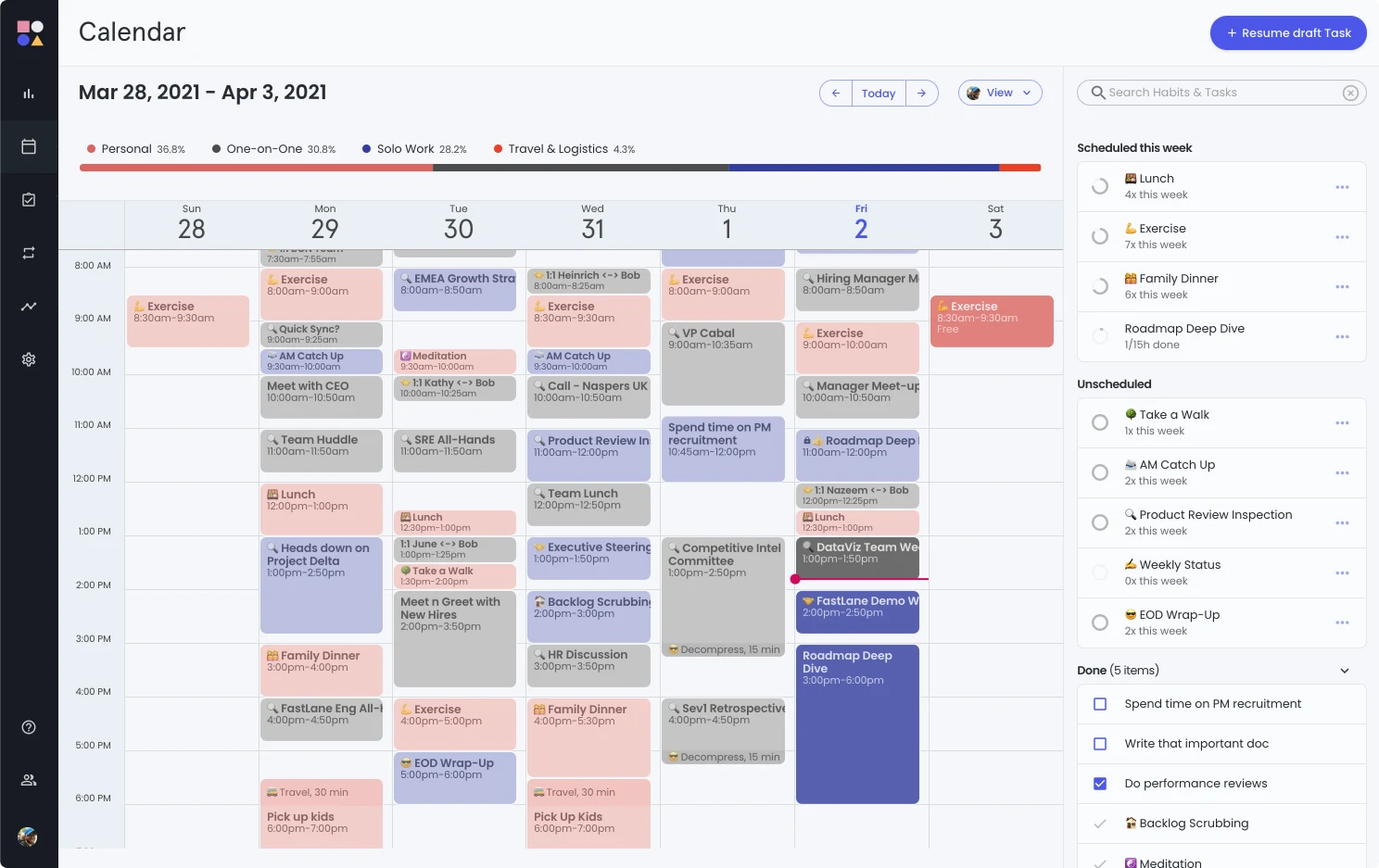5 tips for a successful sales calendar [Reclaim + Calendly]
Create a schedule that reserves space for customer meetings while leaving room for other priorities.
Table of contents
If you’re in sales, it can be tempting to spend virtually all of your time in meetings with potential customers. After all, it’s essential that you close deals and meet (or beat) your quota. But there’s a lot of other work that needs to happen between those meetings. You have demo prep, note-taking, updating Salesforce records, sharing pipeline status, getting time to think about your strategy for closing the quarter, joining QBRs – the list goes on!
In this post, we’ll talk about five essential ways to keep your customer meetings and your heads-down work in balance, as well as showing you how to use Reclaim + Calendly to make your calendar awesome.
Calendly automates meeting scheduling, which solves two huge problems for you as a salesperson: first, it cuts out the back-and-forth negotiations in finding a mutual time to meet, reducing friction in getting time with customers and prospects. Second, it enables you to get valuable time back that you can use to better nurture and convert accounts. It’s an essential platform that gives you a superhuman advantage in closing pipeline.
Reclaim complements Calendly’s scheduling features by helping you to keep your own calendar in check. Reclaim is a smart calendar platform that automatically blocks flexible, adaptive time for your routines and tasks, giving you a simple way to organize your schedule around the stuff that matters to you. And, as we’ll discuss below, Reclaim helps to make your Calendly links even more courteous and powerful.
These 5 tips for increasing productivity show you how to create a schedule that makes room for priorities and important work — while preserving valuable space for your customer meetings — by using Calendly and Reclaim.
1. Merge your calendars and get your schedule under control
You likely have at least two calendars that govern where you spend time. If you’re like most people, you have a calendar for your personal priorities and a calendar for your work ones. In Calendly’s paid plans, you can connect multiple calendars to display your availability across all of those schedules. This is an awesome way to get your customer meetings scheduled without worrying about overbooking across calendars.
But when it comes to meetings within your company – which you probably already have too many of – the problem gets a bit more challenging. When your coworkers go to book time with you in Google Calendar using their Find a Time feature, they will only see events from your work calendar. That means that if you have a doctor’s appointment on your personal calendar that conflicts with an incoming team meeting at 4pm, your coworkers won’t see it and it’ll get overbooked. That just makes your workweek a lot more complicated than it has to be, and there’s really no good solution to it within Google Calendar alone.
Your colleagues may not know to use your Calendly link, and their natural workflow is to use Google Calendar to book time with you. This is where Reclaim can help. Reclaim enables you to automatically block events from any other calendar on your work calendar, merging your availability across multiple schedules so your coworkers never end up (intentionally or unintentionally) booking over your events from other calendars.
When it comes to managing multiple calendars and displaying events from another calendar on your work schedule, another concern is privacy. Reclaim helps to keep events from your other calendars discreet on your work calendar by letting you set different levels of context. For example, you can show others in your organization that you’re busy for a “Personal Commitment” when you’re headed to a doctor’s appointment.
2. Block time for routines between meetings
Blocking time in between meetings is a great way to make room for important work – catching up on email, writing notes to follow up with a customer after a call, responding to customers, updating your SFDC account records, and so on – that sets you up for success with prospects and customers. In sales, it’s imperative to weave in these routines around your meetings so that you’re always prepared before, during, and after critical customer touchpoints.
This may not be the first time you’re hearing about time blocking as an essential sales skill, and you’re probably familiar with why it matters. But you might also have tried it and experienced a number of challenges: time blocking manually on your calendar is extremely difficult to keep up-to-date as your calendar changes (and it changes a lot).
Reclaim’s Habits feature can help you to keep your calendar defended for your routines without the pain of moving events around. Instead of having to stick to a rigid plan that doesn’t adapt to your calendar, Reclaim lets you define flexible time ranges where you’d like your Habits to occur, which means you get many more possibilities for your routines to get scheduled every day.
For example, maybe you want to have a routine every day to write up all your call notes and submit them to your Salesforce account records, as you have to keep your manager and sales operations team up to date on the status of your accounts. Let’s call this the “Add Call Notes to SFDC” Habit:
In this example, we’re telling Reclaim that it’s OK to schedule anywhere from 30 minutes to 1 hour between 3pm and 7pm. Ideally, we want to get it done at 3:30pm, but if that time isn’t available, Reclaim will just find the next optimal time in your schedule automatically – no manually moving blocks around on your calendar.
By using Reclaim in combination with Calendly, you can keep your calendar defended for the routines that matter for closing deals while still getting the time you need to meet with customers.
3. Get time for tasks before your customer meetings
We’ve already talked about the importance of blocking time for your routines in between the meetings you set up with Calendly. But what about specific tasks that you need to get done in preparation for your calls?
Again, time blocking is your friend here. If your to-dos and prioritized work aren’t reflected on your schedule, it too often gets pushed into late nights and weekends – and you find yourself rushing at the last minute to get it done. But just like time blocking for your routines, blocking time for your to-dos comes with a similar set of challenges: with your schedule changing constantly, it can be really hard to make sure you actually have time for the tasks you need to get done.
Reclaim gives you the same flexibility for your Tasks as it does for your routines. Except instead of defining a regular cadence, you just have to tell Reclaim when something is due, how long you need to get it done, and Reclaim takes care of the rest. And, just like Habits, Tasks that you block on your calendar will automatically move around and accommodate interruptions as your schedule changes.
Imagine you’re putting together a POC for a prospect, and you need to get some demo assets together so you have a clear script for presenting before your presentation. The meeting is in two weeks, so you’ve got plenty of time, but you don’t want to forget about it and end up rushing the work last minute. Reclaim can get this intelligently blocked on your calendar within seconds:
Reclaim will look for availability before your due date to block time for your demo assets task, and split it up into multiple events automatically if needed. And, if new meetings are scheduled that conflict with the task, Reclaim will move it around to find the next best time slot.
In conjunction with Calendly, time blocking for your tasks using Reclaim gives you the best of both worlds – you get the time you need with customers, while ensuring you’re never arriving to a meeting empty-handed.
4. Send better (and more flexible) Calendly links
OK, so we’ve talked a lot about time blocking for your routines and tasks. But with so much of your calendar dedicated to heads-down work, you might be asking yourself: when do I meet with customers?
Obviously, meeting with customers needs to be one of your top priorities if you’re in sales. Research from Chorus found closed-won deals involved 11% more hours of meetings than lost deals. That means that even one or two meetings that get pushed off to next week due to lack of availability might be the difference between missing or making the quarter!
When your entire calendar is blocked off -- even if it’s for important work -- you leave very little wiggle room in your schedule to meet with customers and prospects. That means if you send out a Calendly link to a customer to schedule time with you, they might get an experience that looks something like this:
There are two big problems with sending links that don’t have much availability: first, it makes it harder for people to meet with you, and likely results in them either getting frustrated or deciding to push an important meeting back by a week or two. Second – and maybe more importantly – it’s likely that some of the work you’ve blocked time for isn’t as essential as meeting with your customer. So you’re making it harder for customers to meet with you, even if you’re not intending to.
This is where Reclaim’s approach to time blocking really pays off. In addition to moving your routines and to-dos around on your calendar automatically when they’re interrupted, Reclaim also keeps your time blocks much more flexible so you get a lot more availability in the Calendly links you send out. It does this by dynamically toggling your blocked times between “free” and “busy” based on how busy your calendar is.
Reclaim runs millions of simulations daily against your calendar to detect when your day is getting really full. If you’ve got plenty of space, Reclaim will add your Tasks and Habits to your calendar but mark them as free time. That means that you see the time as blocked, but others won’t. As your week fills up – or, in the case of Tasks, as you get too close to your due date and start running out of possibilities to get the work done – Reclaim automatically flips events to busy, which means that they actually block out your availability from others.
Let’s take an example of how this might work in practice: Here’s a typical day that’s been time blocked using Reclaim. You’ve got a mix of personal (“Lunch”, “Take a Walk”) and work routines (“Prospecting”, “Customer Research”) as well as an important task to work on a demo presentation.
Looks pretty full, right? Looks sorta like you might not have more than 30 minutes to meet with anyone that day!
But let’s look at this same day through the lens of your Calendly link:
Tons of free time! This is Reclaim’s free / busy toggling in action. Because there’s lots of “flex” in that day, and therefore lots of available opportunities for you to work on your routines and tasks, Reclaim knows to keep them available for meetings. As your day fills up, or as you get closer to the start time for your time blocks, Reclaim will automatically defend them so that you still get time to get the important work done.
Reclaim and Calendly work together here to give you the best of both worlds: you get to be available for meetings and customers, but not so available that you end up missing out on the many other things you need to get done to be successful.
Webinar: How to Build Your Competitive Advantage With Sales Automations
5. Balance your priorities by auditing your calendar
Calendars are living things that require constant care and feeding. If you don’t take time to analyze how your schedule is balanced across your priorities, you might find that your calendar is running you – and not the other way around. Calendar auditing is the art of reviewing your schedule on a regular basis and trying to realign your time to your priorities, eliminating unnecessary distractions wherever you can.
Calendar audits are hard for several reasons:
They require us to deeply inspect where our focus should be.
They require us to potentially say “no” to lots of things.
They require a lot of data gathering that is pretty hard to do without custom scripts or knowing how to navigate Google Calendar’s API.
Because of these challenges, people tend to do calendar audits very infrequently, or even not at all. That means that you might have lots of meetings that are taking up valuable time that could be dedicated to selling, or work that isn’t dedicated to your top priorities occupying real estate on the calendar. This is where Reclaim can also help you to keep your schedule in check.
Calendar productivity stats show you where and how your time is actually being spent, allowing you to monitor key metrics on your own time management performance. You can see a breakdown of your entire week by how many hours of free time you have, time in meetings, and work sessions you’ve time blocked across shallow and deep solo work.
Reclaim also ties in your life stats with how many hours of personal time you have that week, travel time, and vacation time so you have the added context of why your work stats might be different for a given week.
A Time Management for Sales study from InsideSales.com found reps spent only 37% of their time selling. While every sales person has a unique approach to allocating time, you may find it helpful to measure your own time stats to analyze the winning balance between meetings and solo work.
Stats are great, but they’re useless without the ability to take action. Reclaim offers a feature called Planner, which enables you to see your productivity stats in the context of your calendar – and immediately take action to reshuffle things if your schedule looks out of alignment.
Imagine a moment where you discover that a customer proposal you were planning to deliver next week is suddenly due tomorrow. In Planner, you can just click one button and tell Reclaim to prioritize that proposal, and it’ll automatically adjust your schedule to accommodate it.
With Calendly and Reclaim in the mix, you have everything you need to be a highly productive and efficient salesperson. You can finally build and maintain a schedule that gives you a balance of internal meetings, customer appointments, and focus time to make progress on your most important sales goals.
No more worrying about the toilsome stuff like negotiating schedules or playing Calendar Tetris. Instead, you get to focus on what you’re uniquely good at: making your customers successful and driving new business.
Get started with Calendly
Ready to make scheduling easier than ever?
Related Articles
Don't leave your prospects, customers, and candidates waiting
Calendly eliminates the scheduling back and forth and helps you hit goals faster. Get started in seconds.

